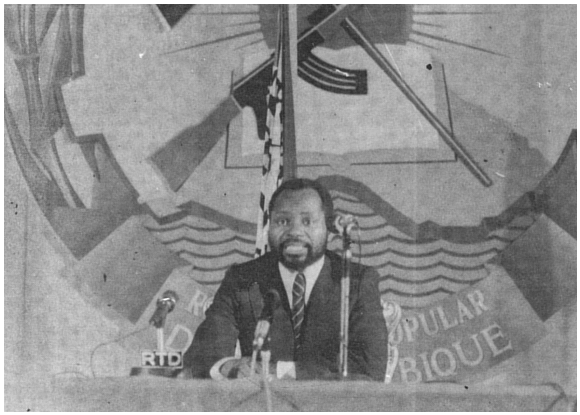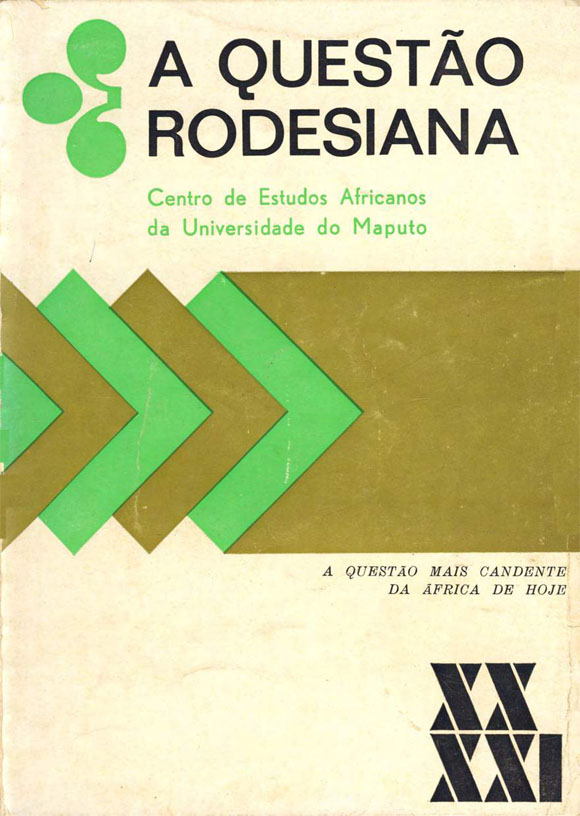Mozambique's International
Relations with Zimbabwe
Dossier MZ-0146, part 1
![]()
![]()
1. The Zimbabwe Liberation
Struggle, 1975-1980

Samora Machel announcing that the border between the People's Republic of Mozambique and the rebel British colony of Rhodesia was to be closed, 3 March 1976. This decision carried high costs for Mozambique.
Relations between the British in Rhodesia and the Portuguese in Mozambique were generally amicable after World War II, with Rhodesia using the port of Beira to export key products such as tobacco. There was significant labour migration from central Mozambique to the tea plantations in Rhodesia. In 1964 armed struggles for independence were launched by African nationalists in both territories, and in November 1965 white settlers in Rhodesia, led by Ian Smith, announced a Unilateral Declaration of Independence (UDI) from Britain. Despite some difficulties, relations between FRELIMO and ZANU, with their shared history of armed struggle, have remained close in the decades since. The illegal white minority Rhodesian regime relied on support from the Portuguese as well as from apartheid South Africa, but it was severely shaken by the Portuguese coup of 25 April 1974 and by the subsequent independence of Mozambique, which exposed much of its northern and eastern borders to the threat of infiltration by nationalist guerrillas based in the now sympathetic neighbouring country. In early March 1976, independent Mozambique, as a member of the Frontline States and with some support from the international community, announced the closure of the frontier with Rhodesia, cutting the rebel colony off from access to Beira port and the sea.
The decision to close the border was costly for Mozambique, both in financial terms (the loss of revenue from Rhodesian export transhipments) and in terms of loss of life. Rhodesian forces attacked Mozambique directly on multiple occasions, as at Nyadzonya (also spelled Nyazónia) camp in August 1976, where over 1,000 people died, and indirectly by helping to create and sustain the RENAMO insurgency in the central provinces.
Above: The cover of the Lisbon edition of the study of Zimbabwe’s political economy, prepared originally in English for the nationalist delegation at the Geneva Conference in 1976 by the Centro de Estudos Africanos under the directorship of Aquino de Bragança. There were four editions of this work: a mimeographed English text, a mimeographed Portuguese version with a preface by Robert Mugabe, the Lisbon edition published in 1978, and finally a local Maputo printed edition. Click on the image above to access a PDF file of the complete text.
In late 1979, the Mozambican government played an important role in helping to pressure the Zimbabwean nationalists of the Patriotic Front to accept the terms of the Lancaster House agreement despite their serious misgivings over land rights. Fernando Honwana, who was one of President Samora Machel’s most trusted advisors (and who spoke English fluently) participated actively in the proceedings, meeting UK Prime Minister Margaret Thatcher several times. At the same time, Machel frequently discussed the way forward with the Zimbabwean leader Robert Mugabe. Zimbabwe became independent in April 1980, with Robert Mugabe as its first democratically-elected prime minister.
![]()
MHN Resources
Consolidated Downloadable Zipped Files
Click on the yellow folder image below to download the first part of the dossier of documents and press clippings in PDF format concerning relations between the Mozambican government and Zimbabwe. For material on Zimbabwean political and military participation in the struggle against the RENAMO rebellion, see also the series of pages "Conflict with Renamo".This edition of the dossier contains 66 documents and is dated 25 March 2021. New material may be added from time to time.
![]()



![Aluka: Struggles for Freedom [subscription required] Struggles for Freedom](imgs/aluka_200.png)




